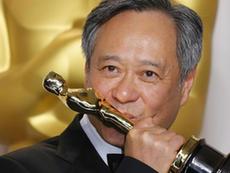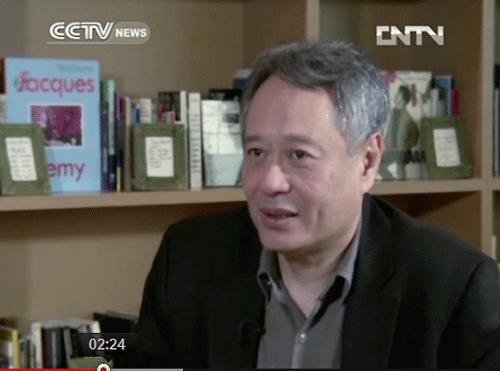Interview with Ang Lee on judging Cannes

 0 Comment(s)
0 Comment(s) Print
Print E-mail CNTV, May 20, 2013
E-mail CNTV, May 20, 2013
CCTV's Kate Parkinson was recently lucky enough to catch up with double-Oscar-winning director Ang Lee. The director is this year a member of the festival's jury. We spoke to him in between screenings, where he discusses his own success, rivalry with head of the jury, Steven Spielberg, and Chinese cinema.
KP: You received an Oscar this year for 'Life of Pi', and have received many other awards during your career so you know very well how it feels to have your work recognised. But how does it feel to be on the other side, to be a member of the jury?
AL: Basically I am uncomfortable to give my judgement or a rating to a film in public but, since I got many awards I should do my service to the community. So there are a couple of things, one is that it is difficult to select films, to award them. You know that is going to change the film, the film makers, in many cases it can change their lives and people's perception, it promotes them. On the other hand the pleasure is you watch many movies with other film makers and you get to talk with them and at times you talk to each other about film making, performances. So the colleagues are enjoyable. Until maybe you have to argue sometimes, that can be irritating!! But I only did this once before this and that was a pleasant one and so far we, we are good colleagues, they are a very good bunch of people, filmmakers, and we are about to have our first meeting tomorrow. Maybe there will be arguments.
|
|
|
Director Ang Lee is this year a member of the festival’s jury. |
KP: So you sit down to discuss for the first time tomorrow, the relationship you say is going well so far but do you expect there to be heated debates? It's q diverse jury, lots of different opinion.
AL: I don't know, if people just go 'oh ok, if you say so' then you're not passionate and if you believe in something then you might have a heated argument. But I don't know, I've never had that with any of these colleagues, so far they've been good colleagues, good friends, and we really respect each others work. So, so far so good, but we'll see what happens tomorrow. I cannot tell. I cannot say I'm sure it will be a good will argument, the argument could be good. Who knows. You learn from each other.
KP: And what about your relationship with the head of the jury, Steven Spielberg, who of course you were competing against for that Best Director Oscar. So what's it like to be reunited with him here in Cannes?
AL: It's great to see him, we're not competing. And he politely corrals us during the schedule and lays out the ground rules, how we go about things. So far he has been very at ease, very easy to work with. You know everyone respects Spielberg. The Oscar campaign, you know we said, both of us said in the press conference, that its a race, its like a campaign but once that is over I will worship him just the same and he said he liked my work. So right now we're colleagues.
KP: And with an obvious mutual respect for each others work.
AL: Oh yes, yes. You have to. Because making movies is really hard. When people make good movies you just have to respect that.
KP: It's a really diverse selection of films in the competition line up this year, do you think thats one of the reasons that Cannes is such an interesting film festival?
AL: It's not the most popular, Oscar is the most popular. But this is probably the most prestigious one. A lot of film makers, if they can make it to the time schedule, Cannes is like the first choice automatically and of course the centre of the attention is in the competition so you get the best of the best. But Cannes does have its own things. Its not particularly working for the entertainment, for the regular movies, even if they're well done. It has to be political and stylishly sounding, it has to be a movie about something, not necessarily fitting the mainstream and it has its own reputation … I keep calling it its 'thing', Cannes has its 'thing'. A lot of festivals have that. First of all Cannes is very distinguished… they're a little bit in the highbrow area… but so far I have seen good movies. They have to select from thousands of movies, nearly 2,000 maybe, and it comes down to 20… and those are good movies. The ones we've seen so far, they're good movies. And yes, they're different.
KP: China's presence is really being felt in Cannes this year. Of course we've got Jia Zhangke's film A Touch of Sin in the main competition and also two Hong Kong directors screening in sidebar selections. Do you think China's increased participation in Cannes is a natural evolution for Chinese cinema?
AL: Yes, it started in the 90s. I think in the 90s there were more Chinese films in the competition that in this decade probably. Since they started making movies the Chinese films always - China, Hong Kong, Taiwan - always have significant presence here in Cannes.
KP: Would you like to see more Chinese films here in competition?
AL: Of course. There are two things that have happened. If you come to Cannes it is art house. But lately what has happened is there has been a big boom in the box office. One movie after another hits the high mark, the numbers are almost close to the North American box office. Its very encouraging. That's nothing to do with Cannes but it will build a very significant film industry and appetite for the audience to watch movies. The Chinese like to watch movies, they have not got jaded yet so that's a big healthy market so that should support a lot of happening in film making of all times and I hope nobody forgets about art films, like Jia Zhangke's film for instance. So yeah, I hope that China is going to make all sorts of movies … big movies, small movies, middle brow, high brow, everything. And I certainly like to see them here in Cannes.
KP: I think its fair to say that every Chinese director wants to be the next Ang Lee so what would your advice be to emerging directors trying break into the international market?
AL: Well there are a lot of people making movies for commercial reason and thats fine, you have to know your crafts and you have to be talented and know the film rules and how the marker works, what people's tastes are. If you want to make movies like how I make them I think its important that you are honest. Make movies you have feeling for and not forge something because the market needs it or because you want to be seen in a certain way. But if you really strongly believe that you have to do it then you will find a way to do it and I think that is the only thing for me.
KP: Ang Lee, thank you for talking to CCTV.







Go to Forum >>0 Comment(s)